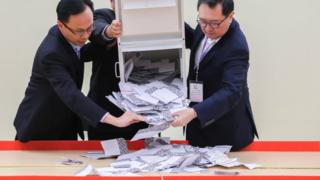
- Chinese state media outlets have attempted to downplay the results of Hong Kong's district elections, which saw the pro-democracy camp score a landslide victory.
Chinese state media outlets have attempted to downplay the results of Hong Kong’s district elections, which saw the pro-democracy camp score a landslide victory.
The government had been hoping the election would bring a show of support from the so-called “silent majority” opposed to the protests.
Instead, it saw some significant pro-Beijing candidates lose council seats.
Chief Executive Carrie Lam has acknowledged public “unhappiness”.
In her first public appearance since the results, she said she recognised that people were concerned over “deficiencies in governance, including unhappiness with the time taken to deal with the unstable environment”.
However, she offered no new concessions.
‘No need to over-interpret the victory’
Reaction from state media outlets has ranged from making no reference at all to election results to overt claims that “tampering” had taken place.
State broadcaster CCTV’s daily news programme Xinwen Lianbo stayed silent on the results, instead accusing the US of interference.
Xinhua, the state’s press agency, made some allusion to the fact that elections had taken place over the weekend but pivoted back to the violence of recent weeks, stressing the need to restore order.
News outlet the Global Times did cover the elections in detail, concluding in an English-language article that the pan-democrats had “scored a big win”.
However, the report also said there was “no need to over-interpret the victory of pan-democrats”.
The Global Times’ editor Hu Xijin, known for his outspoken comments, mentioned on Chinese social media site Weibo that the pro-Beijing camp had failed, but added that the district council elections were on a very “local level”.
English-language paper China Daily reported that the elections had concluded, but made no reference to the pro-democracy camp’s victory.
China Daily separately posted a picture on Twitter with the caption: “That’s how the oppositions [sic] tampers with a fair election.”
The picture accuses protesters – without evidence – of taking citizens’ ID cards to stop them from casting their votes, and of misleading the elderly to vote for pro-democracy councillors.
Exposing a flaw
Stephen McDonnell, BBC News, Hong Kong
For Beijing, for Carrie Lam’s administration and even Hong Kong’s police force, the district council elections have just punched a large hole in their “silent majority” narrative.
The message from the establishment had been that most residents were fed up with protesters and wanted the government to crack down hard on them.
The problem with that line now is that district council elections didn’t pan out that way and in fact revealed sentiments overwhelmingly in the opposite direction.
Hong Kong’s leader is already being criticised over her first public appearance since the election, when she said people wanted to “go back to their normal lives” and could “no longer tolerate the chaos” of demonstrations.
It’s hard to see how this argument can be sustained given that the electorate has overwhelmingly voted for a rejection of the way things were, and winning pro-democracy candidates saying that a return to the status quo is not an option.
The central government in Beijing has chosen a much more blunt instrument by stopping virtually all television, radio and newspaper coverage from mentioning the actual election result and hoping that not too many people on the Chinese mainland hear about it via social media.
After all this is a pretty hard one to explain given that, prior to this weekend, story after story in China’s state-run media had been portraying the protest movement as a bunch of fringe vandals making life miserable for most in Hong Kong.
An overwhelming win
Hong Kong’s district councillors have only limited political influence – they most deal with very local issues like transport and amenities.
But Sunday’s election drew particular attention because it was the first vote to take place since anti-government protests first began in June.
Some of the councillors will also play a role in choosing the next chief executive, Hong Kong’s leader.
A record 4.1 million people had registered to vote – more than half the population – and more than 1,000 candidates ran for 452 electable seats.
Candidates sympathetic to the pro-democracy cause won a total of 347 seats and according to local media, now control 17 of the 18 councils.
The protests were triggered by a bill which would have allowed suspects to be extradited to mainland China.
This bill prompted fears that China was increasingly encroaching on the city’s autonomy, including its right to judicial independence.
It was eventually withdrawn but the movement has now evolved into a broader protest against the way the city is run.
Earlier last week, US lawmakers overwhelmingly passed legislation in support of Hong Kong’s protesters.
On Monday, China’s foreign ministry summoned the US ambassador to protest against the passing of the bill, accusing the US of “meddling in Hong Kong affairs and interfering in China’s internal matters”.
Beijing warned there would be “consequences” if the bill is signed into law.



